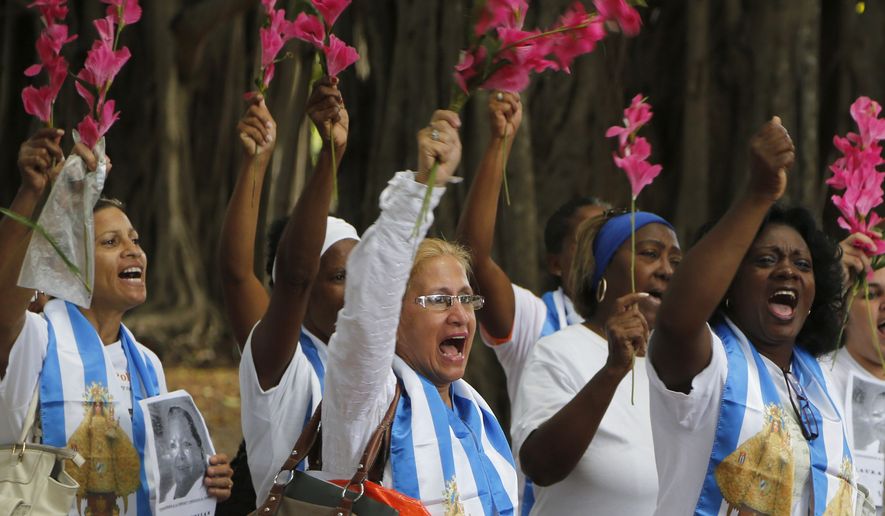The Obama administration has responded harshly to the Cuban government’s arrest this week of political dissidents planning a protest in downtown Havana, casting an uncomfortable shadow over the historic detente announced just weeks before between the U.S. and the Castro regime.
The State Department late Tuesday night “strongly condemn[ed] the Cuban government’s continued harassment and repeated use of arbitrary detention, at times with violence, to silence critics, disrupt peaceful assembly and freedom of expression, and intimidate citizens.”
The statement followed reports that Cuban authorities had detained overnight dozens of pro-democracy and free speech activists this week, including at least three members of the nation’s political opposition ahead of a planned protest art performance in Havana.
There was confusion Wednesday over the status of expatriate Cuban artist Tania Bruguera, a central figure in the protest. Her family told The Associated Press she had been released during the day, but she failed to appear at a press conference dissidents planned later in the day, leading to speculation she may be back in custody.
Longtime dissidents have been among the most critical of President Obama’s surprise diplomatic outreach to Cuba last month, saying he did not demand adequate concessions on civil liberties and the release of political prisoners in exchange for ending the 53-year U.S. economic embargo.
Ms. Bruguera had arrived in Havana last Friday with plans to set up an open microphone for anyone to speak on the Plaza of the Revolution, a square overlooked by the nation’s military headquarters and huge portraits of revolutionary heroes Che Guevara and Camilo Cienfuegos. The plaza is also within view of the offices of Raul Castro, who took over the Cuban presidency in 2008 from his brother and longtime Cuban dictator Fidel Castro.
SEE ALSO: 64 percent of Americans favor establishing diplomatic ties with Cuba: poll
But the event never came off, as Cuban authorities moved in.
The dissident Cuban Commission for Human Rights and National Reconciliation said more than 50 Cubans were detained, and that about 15 of them were still being held on Wednesday afternoon, according to the Reuters news agency. The human rights group said the incident showed that little has changed in Havana despite Mr. Obama’s diplomatic outreach.
“At the same [time] the Cuban government is normalizing its relations with the U.S. government, it has not decided to normalize relations with the people of Cuba,” Elizardo Sanchez, who heads the commission, told Reuters.
The State Department statement on Tuesday night cited reports that Cuban authorities have separately detained or arrested several other “peaceful civil society members and activists, including Luis Quintana Rodriguez, Antonio Rodiles, Danilo Maldonado, Reinaldo Escobar, Marcelino Abreu Bonora and Eliecer Avila.”
“Freedoms of expression and peaceful assembly are internationally recognized human rights, and the Cuban government’s lack of respect for these rights, as demonstrated by [the] detentions, is inconsistent with hemispheric norms and commitments,” said the statement.
Messy realities
The back-and-forth between Washington and Havana is exposing the messy realities behind last month’s much-touted announcement of a diplomatic thaw.
President Obama pledged on Dec. 17 to ease the U.S. trade embargo on Cuba and begin moving toward full diplomatic relations. While many have hailed the announcement as a long-overdue reconciliation, some of Cuba’s most prominent activists say they feel betrayed by the new U.S. plan to negotiate with a communist government Washington spent decades trying to undermine.
“I think President Obama made a mistake,” Berta Soler, head of the Ladies in White, Cuba’s best-known dissident group, told The Associated Press. “Cuba won’t change while the Castros are around. There will be positive changes for the government of Cuba, but not for the Cuban people.”
The Obama administration has actually long been aware of such concerns. The Washington Times reported in 2013 that the State Department was quietly holding talks with a cadre of Cuban natives in Washington — including democracy activists offering insider views of the communist island’s politics.
The activists warned at the time that most pro-democracy advocates operating in Cuba opposed lifting the U.S. embargo for fear the Castro brothers would no longer have an incentive to yield to U.S. criticism over their regular crackdowns on free speech.
In announcing the rapprochement two weeks ago, President Obama said he was under “no illusion about the continued barriers to freedom that remain for ordinary Cubans,” and U.S. diplomats have repeatedly cautioned about expecting major short-term changes.
For his part, Raul Castro has insisted Cuba negotiated the secret deal with Mr. Obama without compromising on the communist government’s “principles.” He also warned in mid-December that Cuba’s political dissidents may use protests and other tactics to try to undermine the accord.
They will “do everything possible to sabotage the process without ruling out provocative actions of any kind,” the Cuban president said.
The U.S.-Cuba deal called for the release of 53 political prisoners held by the Castro regime, but so far the prisoners have not been released or even identified.
This week’s arrests seem certain to complicate the situation and, specifically, whether the Obama administration intends to take any action other than rhetorical protests against rights abuses in Havana.
“We have always said we would continue to speak out about human rights and as part of the process of normalization of diplomatic relations,” State Department spokesman Jeff Rathke said in Tuesday night’s statement. “The United States will continue to press the Cuban government to uphold its international obligations and to respect the rights of Cubans to peacefully assemble and express their ideas and opinions, just like their fellow members of civil society throughout the Americas are allowed to do.”
• This article was based in part on wire service reports.
• Guy Taylor can be reached at gtaylor@washingtontimes.com.




Please read our comment policy before commenting.